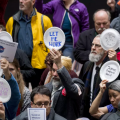The financial impact of COVID-19
Dear Colleagues,
I want to update you on the financial impact that COVID-19 is having and will continue to have on all Smithsonian operations.
First, I want to reassure you that we have many strengths unique to our organization that will allow us to withstand this crisis. Two-thirds of the Institution’s budget is congressionally appropriated, which has been critically important. We already have received support from Congress, which appropriated $7.5 million in direct federal support to cover the purchase of protective equipment, critical supplies, and to bolster our robust and rapid transition to a telework model for the majority of our workforce, both federal and trust. Given our free-admission model and strong cash position, we have not experienced the immediate payroll crisis that our colleagues in other non-profit institutions have.
While our financials are strong overall, our extended closure has led to drastically reduced retail earnings and canceled events. Despite our federal stature and support, we still need to contend with serious financial shortfalls and the impact those losses have on the health of our trust funds. Currently, we are projecting an estimated $22 million loss if we remain closed through May. There is no clarity on the duration of this event, and our peak summer months are quickly approaching. As a result, we need to take a phased and measured approach to the problem right now. The measures outlined below will start to address and help mitigate some of our trust losses.
- Effective in May, senior-level trust staff (those in pay plans SY, SZ, SA, non-grant-funded/contract-funded IL, and those designated as senior level in Smithsonian Enterprises) will see their annual salary reduced by 10% for a period of one year. The Deputy Secretary and I have agreed to take a 15% reduction for the same period.
- Non-senior trust employees (those at grades 15 and below and those in the AE pay plan) will not have their salaries reduced.
- For senior-level trust employees, FY20 salary increases and performance awards normally provided in January 2021 will be eliminated. Special-act awards are permitted for senior-level trust employees, but they will be rare and require my approval.
These measures are only part of the solution to address the deficit, and we have initiated the following additional actions:
- We will enact a hiring freeze on future trust hires effective immediately. We have been working with individual units on the current trust backlog and will advance those that still make sense in this new environment. We also recognize there will be exceptions for certain types of funding, such as grants and contracts, gifts, unit trust reserves, and certain director positions.
- The Deputy Secretary’s office will plan and execute a 10% reduction for all discretionary trust expenses managed at the institutional level in the upcoming weeks. Some of those reductions will have unit implications. Each unit director will also look at their own unit trust situation and take the appropriate actions based on the individual situation.
Additionally, there are several less-immediate actions that will require careful thought and consultation, but I want you to be aware of these activities as well:
- I have asked the senior leadership team to assess the organizations most financially vulnerable due to this crisis and to identify mitigation strategies. We need to manage these circumstances carefully and ensure that all Smithsonian units have operating models that are able to withstand a prolonged closure or a re-emergence of the virus at a later date.
- Second, I have tasked the senior leadership team with examining structural changes or financial efficiencies that might improve our effectiveness and save money. For example, in creating new Under Secretary offices, we will look for opportunities to share resources rather than default to stand-alone units.
- We will re-evaluate the Smithsonian’s 403B retirement plan over the next few months. We need to benchmark the Institution’s contribution level against similar plans and assess whether an adjustment is warranted.
- We will evaluate the possibility of a targeted trust buyout program, looking at potential timing, amounts, and targeted sectors of the trust workforce.
Federal senior leaders, who have served the Smithsonian so well, might ask whether there are ways in which they can contribute to our efforts to mitigate trust losses. There are a number of federal laws and policies that complicate such a gesture. I encourage federal senior leaders to take actions such as donating leave to colleagues in distress from the crisis, giving philanthropically to the Combined Federal Campaign and Feds Feed Families, or volunteering their skills. Our federal appropriation is strong, and I know these colleagues have sacrificed previously.
These are challenging times that require strong measures. The decisions we make right now have the potential to impact, help, and better position the organization for the future. I recognize these actions are difficult, personally and professionally. Now more than ever, I appreciate your support, dedication, and commitment to the Smithsonian. I sincerely hope we can return to public operations soon and begin the work of reshaping the Smithsonian to be stronger than it has ever been.
Sincerely,
Lonnie G. Bunch III
Secretary
Posted: 29 April 2020
-
Categories:
Administrative News , From the Secretary , News & Announcements







